An Interview with Richard Kluft MD,
13th December 2017
Selected Excerpts
Warwick Middleton MD, Past-President, ISSTD
WM: Is there anything, when you look back at your formative childhood years…that predisposed you to end up with the career path that you took?
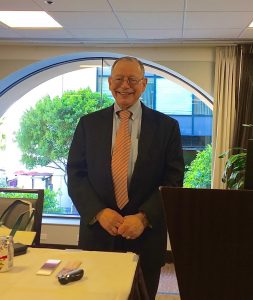
Rick Kluft, San Francisco, 2016
RPK: I have asked myself that only every day. (Laughs) You know I was never pushed to go into medicine, but I experienced the kind of pressure that children of doctors know all too well. Without a word being spoken, you realise that you are free to be any kind of doctor that you want! So, as close to a rebellion as I could make from a benign authority was to become a psychiatrist after my starting in internal medicine.
But I really think it is a little deeper than that. I saw a lot of stuff when I was a kid that was not trauma directed toward me, but which I witnessed. My father came back from WWII in terrible physical shape. He was in the VA Hospital for a couple of years before being released home. My sister was born with some problems that required intensive physical therapy for years. … My grandparents on my mother’s side were taking care of me while my father was in the military, and … I have very clear memories of my grandmother learning yet another one of her siblings had been reported dead in the Holocaust. I think that had a profound impact on me, probably of the sort that I could not even articulate until after my analysis when I started to hang out with second generation Holocaust experts like Ira Brenner and had my eyes opened to what that meant.
WM: Before you became involved in dissociative disorders, what were your career aspirations?
RPK: (Laughs) I thought I would either be an academician, and maybe a director of residency training, or a private practitioner in a small city…
WM: So, what went wrong?
RPK: (Laughs) Towards the end of 1970 I found a multiple. I must admit she was not the first I diagnosed but she was the first I found, and after I saw the second one, I realised what I had in the first one. I started learning that there were people who blocked out a tremendous amount, whose minds were compartmentalised …
… I had my once-in-a-career exposure to these patients early. Unfortunately, I had already talked enough about them to ruin my reputation, so they started getting referred to me (laughs) … there were many people at my university who later became prominent in attacking the whole notion of dissociation, and they were instrumental first figures in the False Memory Syndrome Foundation. I became their target while I was still a resident. So, stigmatization led to specialisation.
——————————————————————
WM: When you became the target and you were obviously getting referrals, what was your strategic plan at that point? One can’t
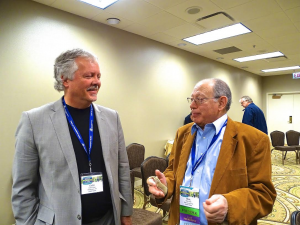
Colin Ross, MD and Rick Kluft, MD, ISSTD Annual Conference, Chicago 2018
be the sole poster child with a target emblazoned on one’s chest as a career path?
RPK: That’s the way it’s been. I’m one of these people for whom some have said that if it weren’t for bad luck, you’d have no luck at all! When I started, I had a few patients whom I took into private practice after graduating residency. But I was a Kennedy-era idealist. I was a community psychiatrist. That was what I decided to do with my life after just getting out of training, and then a very interesting thing happened to me. The African-American community I served decided they wanted to replace me with an African American. Back then, the idea of reverse discrimination had not really been ever thought of in an open way, and the nature of the Pennsylvania unemployment law was that a physician who stopped making money, even if it was salary, was simply understood to be a very unsuccessful physician..(so) I looked for another job. I couldn’t find one that I could tolerate, and then I had a weird idea. And the weird idea was that at that point in time, if you wanted to curse someone, you called them a “borderline”. So, I figured, I really liked Kernberg. I read everything he had written. I wondered if I could see if people were interested in getting rid of some difficult borderlines? So, I let it be known that I wanted to study refractory cases of Borderline Personality Disorder. And, to oversimplify, I suddenly was in full-time private practice. Within three months, I went from 3 patients to a full private practice.
——————————————————————
WM: When did you first achieve some traction with a published paper?
RPK: I (had) joined the American Society of Clinical Hypnosis in 1979. … I presented a paper in 1981 at the Boston meetings: “Varieties of hypnotic intervention in the treatment of multiple personality”.
I expected that paper would die, as it had died several times already, but the man who chaired the panel … was Editor of the American Journal of Clinical Hypnosis. As we walked out of the room, he said, “Well, I think I will get three publishable papers out of that panel”, and I assumed it was the other three. But, to my astonishment, he wanted my paper. That paper was accepted by the American Journal of Clinical Hypnosis and it won the Milton Ericson award for the best paper in clinical hypnosis that year. I was flabbergasted.
——————————————————————
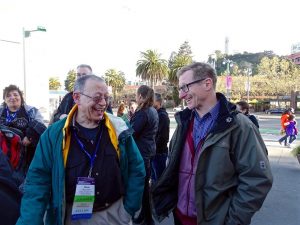
Rick Kluft, MD and Martin Dorahy, PhD, ISSTD Annual Conference, San Francisco, 2016
WM: Can you say what it has actually been like for you – your journey in this field?
RPK: Well let me summarise it all by saying that my office for many years was 500 feet from the office of Martin Theodore Orne. He was one of the first scientific advisers of the False Memory Syndrome Foundation – the preeminent one. Martin made it his business to talk me down in that hospital and to periodically suggest that I should be removed from the staff or even [that] my licence should be challenged. That was very sweet of him. Harold Lief, the other main false memory person, was also on the staff of this hospital. Harold Lief, I refuse to say anything bad about. I worked with him, did some private cases with him. I was very sorry to find myself in opposition to him. I had a great deal of academic respect for the man and he was a very good teacher, so out of the gratitude for his educational contributions to my growth I am loath to go against him. I have had to, and always found the process repulsive …
… I encountered people on the hospital staff, the analytic institute, talking about me in weird ways. … My son came home from school and told my wife that his friend’s father (another psychiatrist in my group)… said [I] was a nut … My wife received sympathetic condolences for my fall from grace. … There was tremendous sabotage.
A turning point for DID and the DSM…
Finally, there was a debate at the American Psychiatric Association meeting in 1987 or 1988, in Montreal, one of the major events in the background of the modern history of DID and in my career. At that time there was a strong reaction against the more liberal and less concretized DSM-III-R criteria for DID, published the year before. Many believed that it opened the door for an epidemic of wild diagnostic enthusiasm. There was growing pressure to exclude DID from the next diagnostic manual.
I believe the topic was stated, “Resolved: multiple personality disorder is a legitimate psychiatric disease (or mental disorder)”. Martin Orne from Penn and Fred Frankel, a professor at Harvard who took the chair of my former mentor, John Nemiah, after he retired, were the negative speakers. David Spiegel and “an unknown debater” would be affirmatives. I became the unknown debater. It was quite an experience. David Spiegel is a masterful debater. He debated at Yale, where the debate team is famous as an incubator for prominent lawyers, judges, and politicians. The format was that after we presented our arguments, there would be audience discussion followed by rebuttals. David and I were sufficiently successful that at
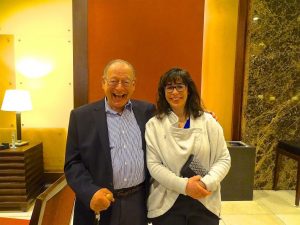
Rick Kluft, MD and ISSTD President-Elect, Christine Forner, MSW, ISSTD Annual Conference, Washington, 2017
the end of the first part, Robert Spitzer, the head of the DSM process, stood up and said, “Well we can all go home – the affirmatives have won!”
And it was very simple … I described cases of multiple personality from the early articles of both Frankel and Orne and argued, “Who would dispute these great authorities? Frankel says it is a legitimate condition, Orne says it’s a legitimate condition.” I welcomed them, belatedly, to the affirmative side. That set them back on their heels. Their retort was basically, “It is okay if we diagnose it, but other people’s diagnoses of multiples are almost always wrong”.
Then David killed them. He said, “So if there is one legitimate case of multiple personality anywhere in the world, such as ones who were diagnosed by you, Drs. Orne and Frankel, then multiple personality is a legitimate psychiatric condition, which you have diagnosed.” He sat down and the audience laughed. It was a good moment.
Robert Spitzer’s proclaiming our victory was a powerful blow to those trying to get it removed (from the DSM). Spitzer’s commentary served notice that DID, despite the power and prestige of those arrayed against it, had to be taken very seriously.
——————————————————————
WM: Can you give us an outline how the Journal “DISSOCIATION” came to be, and how it came not to be?
RPK: Buddy had plans for a journal. He was the thinker; the dreamer. He was going to take the first shot at putting it together. I forget whether it was going to be a year-book or a quarterly journal. For one reason or another, his efforts were not successful. So, I said I’d take it on and I formed a publishing company – Dissociative Disorders Research Publications, Ltd., with Catherine Fine and I holding the stock. With our own publishing company, people said, “Oh My God, they’re serious”, and the Ridgeview Institute, which was George Greaves’ turf, asked if they could be the sponsor. Who was I to refuse? They were very supportive sponsors and their editorial person, Beth Gault, was a pleasure to work with. Then Ridgeview came under the sway of the false memory movement. George Greaves had his position there. George Ganaway became a believer in the false memory cause, there was a new regime at Ridgeview, and that was that…
——————————————————————
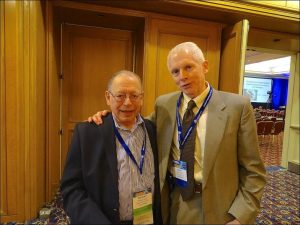
Rick Kluft, MD and Julian Ford, PhD, ISSTD Annual Conference, Washington 2017
WM: What is your perspective on the evolution of the Society over the last 35 years – the highs, lows, mistakes, successes?
RPK: I think that one of the real highpoints has been survival. I mean, for all my disagreement with many of the people who were in our Society, and many of the things they did, I give them the highest grades for keeping things going.
…One of my big battles was against the idea of having a trauma and dissociation society because my prediction had been that we would become a mediocre trauma society and a mediocre dissociation society because we would not be able to compete with the ISTSS as a trauma society and we would be diluting our focus on our major raison d’etre. I was certainly in a minority in respect to this attitude change and name change. So, now we are a complex PTSD society that occasionally says something about dissociative disorders that is separate from complex PTSD, but not that often. And along with that there has been a major change in topics of interest and focus and I am less than happy about that, because there are a lot of people out there doing wonderful work on PTSD that are not necessarily part of this Society, and there are fewer and fewer people out there doing much work on DID. Take away the TOP DID study and a few others and you’re looking at a wasteland….
——————————————————————
WM: Why has [the Society] survived? God knows, there have been enough opportunities to kill it.
RPK: Well, I think there are enough courageous and gutsy members and enough naïvely optimistic members to see the plight of these patients and desperately want to be able to help them. I think human goodness plays a role in our survival, while human stupidity has compromised the quality of that survival.
——————————————————————
WM: Was there a highlight of being President?
RPK: Just the pleasure of collaborating with good people. I never had the sense that I was out there by myself. … I can tell you having a first-class executive, Anne Kadish, was wonderful. She understood what we were trying to accomplish. …The only real angst I had was in the last month of my presidency when I learned that Anne was resigning, and the low point was calling George Greaves and saying, “George, I have some news for you…” He took the hit and said he’d handle it, and he did.
——————————————————————
On Hypnosis and Dissociation
RPK: I’ve actually spent the last year and a half on that and it’s going to result in four articles that are coming out, starting at the end of this year, in
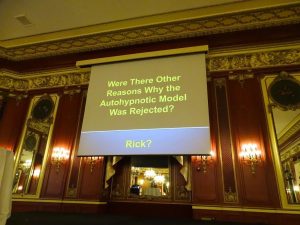
ISSTD Annual Conference, Chicago 2018
2018 maybe, in 2019 in the American Journal of Hypnosis. It’s called the “Hypnosis and Psychoanalysis Project” and includes John O’Neil, Ira Brenner, Mary-Jo Peebles, the late Thomas Wall, also Dan Brown and Stephen Kahn. Steve Lankton, Editor of the American Journal, pushed to get this project under way…
… The full story of Freud’s work with hypnosis and his thinking about it is pretty much unknown. Most generalizations Freud made about hypnosis and that others have made about Freud and hypnosis are inaccurate and incomplete. For example, Masson discovered a letter by a young Sigmund Freud to Minna Bernays in which he describes his own use of autohypnosis. Too complex to go into here… It took me two full articles to summarize the contradictions between the historical record and the generally accepted understandings surrounding these matters. So, long before all this stuff became what we think of it today, Freud was much more expert at hypnosis than is generally credited…
….It scares me that so many books have been written about dissociation without the word “hypnosis” appearing in their index. Paul Dell has just reconfirmed what we all knew since 1836 – that dissociatives are high hypnotisables. We have known that for a long, long time, but we try to deny it.
——————————————————————
On the Future of our Field:
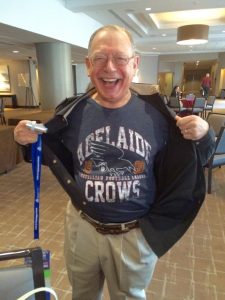
Rick Kluft, MD, ISSTD Annual Conference, San Francisco, 2016
RPK: If you look at the field now, you notice there are two or three major changes. One is the shift in distribution of professions and the membership, there being far fewer physicians … and there are far more women in the mental health professions – all the disciplines. We are at a point in time when women feel increasingly empowered and it may well be that the women of today, being a significant majority, and feeling much more strongly about this whole issue of being pushed around, would react in a much healthier way than the milder milquetoast-style individuals of the late 80s and early 90s …
I can only admire the courage of a lot of the people in the field which I do, side by side with chastising many of them for cowardice….
I think that I would like to see the field take a big deep breath and go back and re-include what it has excluded along the way. I think that there is more integrity in making use of all available knowledge than in earnest elaborations of particular paradigms of practice or research that marginalize or even dismiss what has been learned by scholars and clinicians informed by other models.

